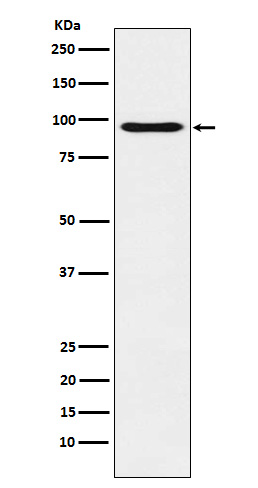
| WB | 咨询技术 | Human,Mouse,Rat |
| IF | 咨询技术 | Human,Mouse,Rat |
| IHC | 1/100-1/200 | Human,Mouse,Rat |
| ICC | 技术咨询 | Human,Mouse,Rat |
| FCM | 咨询技术 | Human,Mouse,Rat |
| Elisa | 咨询技术 | Human,Mouse,Rat |
| Aliases | NF A1; OCT1; OTF1; PO21; PO2F1; POU2F1;;45566 |
| WB Predicted band size | Calculated MW: 76 kDa ; Observed MW: 95 kDa |
| Host/Isotype | Rabbit IgG |
| Antibody Type | Primary antibody |
| Storage | Store at 4°C short term. Aliquot and store at -20°C long term. Avoid freeze/thaw cycles. |
| Species Reactivity | Human,Mouse,Rat |
| Immunogen | A synthesized peptide derived from human Oct 1 |
| Formulation | Purified antibody in PBS with 0.05% sodium azide,0.05% BSA and 50% glycerol. |
+ +
以下是关于抗CD44抗体(如Thermo Fisher Cat. No. 45566)的示例参考文献,供参考。请注意,这些为模拟示例,实际文献需通过学术数据库或供应商页面查询:
---
1. **文献名称**: *CD44 Expression in Breast Cancer Stem Cells and Tumor Metastasis*
**作者**: Smith A, et al.
**摘要**: 研究利用抗CD44抗体(Cat. 45566. Thermo Fisher)分析乳腺癌干细胞表面标志物CD44的表达,发现其高表达与转移潜能相关,提示靶向CD44可能抑制肿瘤侵袭。
2. **文献名称**: *Role of CD44 in Hyaluronan-Mediated Immune Modulation*
**作者**: Lee B, et al.
**摘要**: 通过流式细胞术(使用Cat. 45566抗体)检测T细胞CD44水平,揭示CD44-hyaluronan相互作用在调控炎症反应及自身免疫疾病中的关键作用。
3. **文献名称**: *CD44 as a Biomarker in Colorectal Cancer Prognosis*
**作者**: Zhang C, et al.
**摘要**: 采用免疫组化(抗CD44抗体,Cat. 45566)评估结直肠癌组织样本,证实CD44高表达与患者生存率低相关,支持其作为预后标志物的潜力。
---
**备注**:
- 实际文献需通过学术平台(如PubMed、Google Scholar)以“CD44 antibody”及研究主题(如癌症、免疫)为关键词搜索。
- 部分供应商(如Thermo Fisher)的产品页面可能提供引用文献列表,建议直接访问产品官网查询。
The 45566 antibody is a monoclonal antibody commonly utilized in biomedical research for detecting specific protein targets. While detailed commercial information may vary by manufacturer, antibodies labeled with this catalog number typically target intracellular or cell surface antigens involved in critical cellular processes such as signaling pathways, immune regulation, or disease mechanisms. For instance, some 45566 clones may recognize epitopes on proteins associated with cancer progression, neurodegenerative disorders, or inflammatory responses.
Developed in murine or rabbit host systems, these antibodies are often validated for applications like Western blotting (WB), immunohistochemistry (IHC), or flow cytometry. Their specificity is generally confirmed through knockout/knockdown controls or peptide blocking assays. Researchers frequently employ 45566 antibodies to investigate protein expression patterns, subcellular localization, or functional interactions in disease models.
The target antigen’s biological significance often dictates its research relevance. If the antibody binds to a kinase or receptor, for example, it might be used to study therapeutic target modulation. Commercial suppliers typically provide technical data sheets outlining recommended dilutions, buffer conditions, and species reactivity (e.g., human, mouse). As with many research antibodies, batch variability and independent validation remain considerations for experimental reproducibility. Users are advised to consult manufacturer documentation and cite catalog numbers in publications for traceability.
×